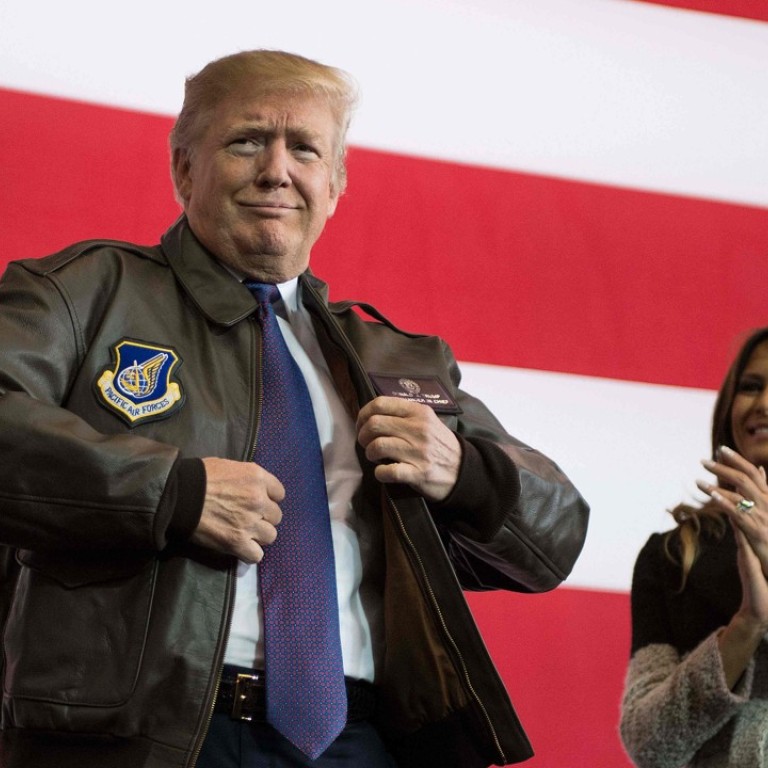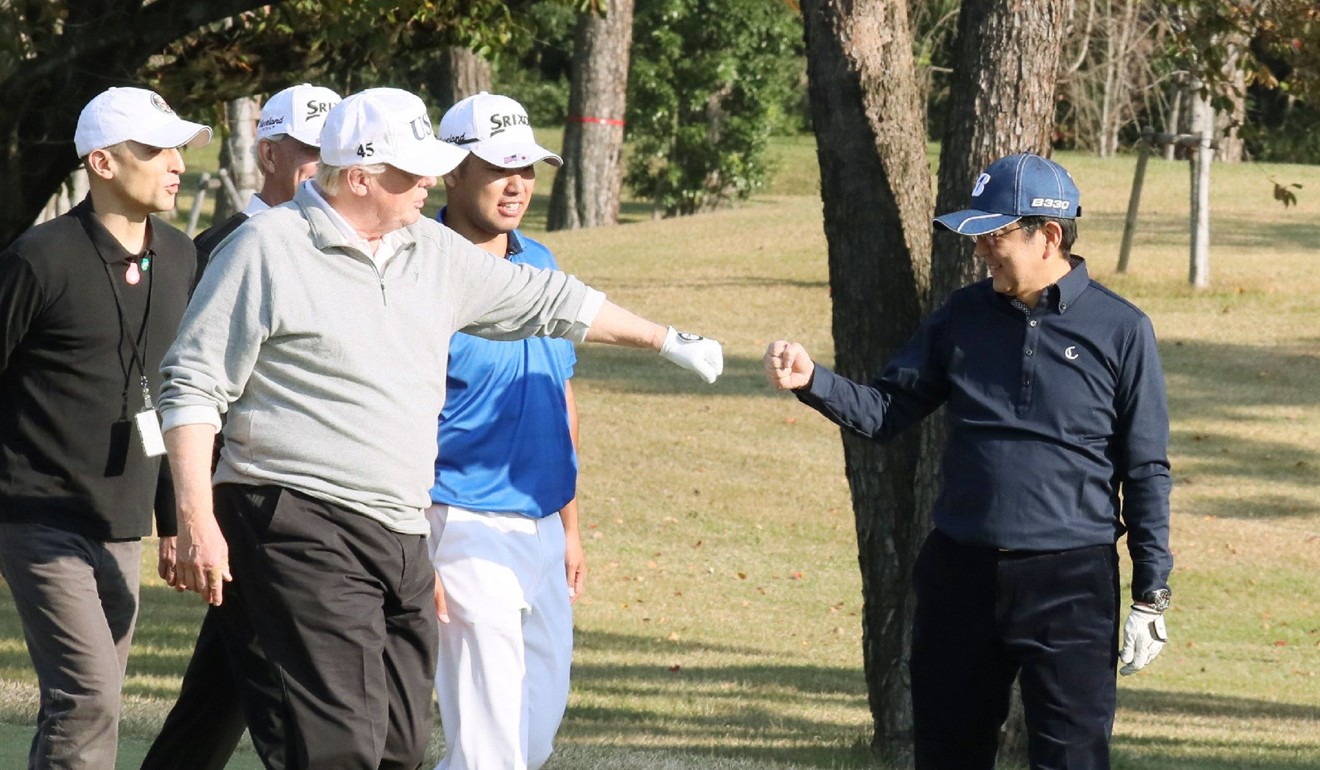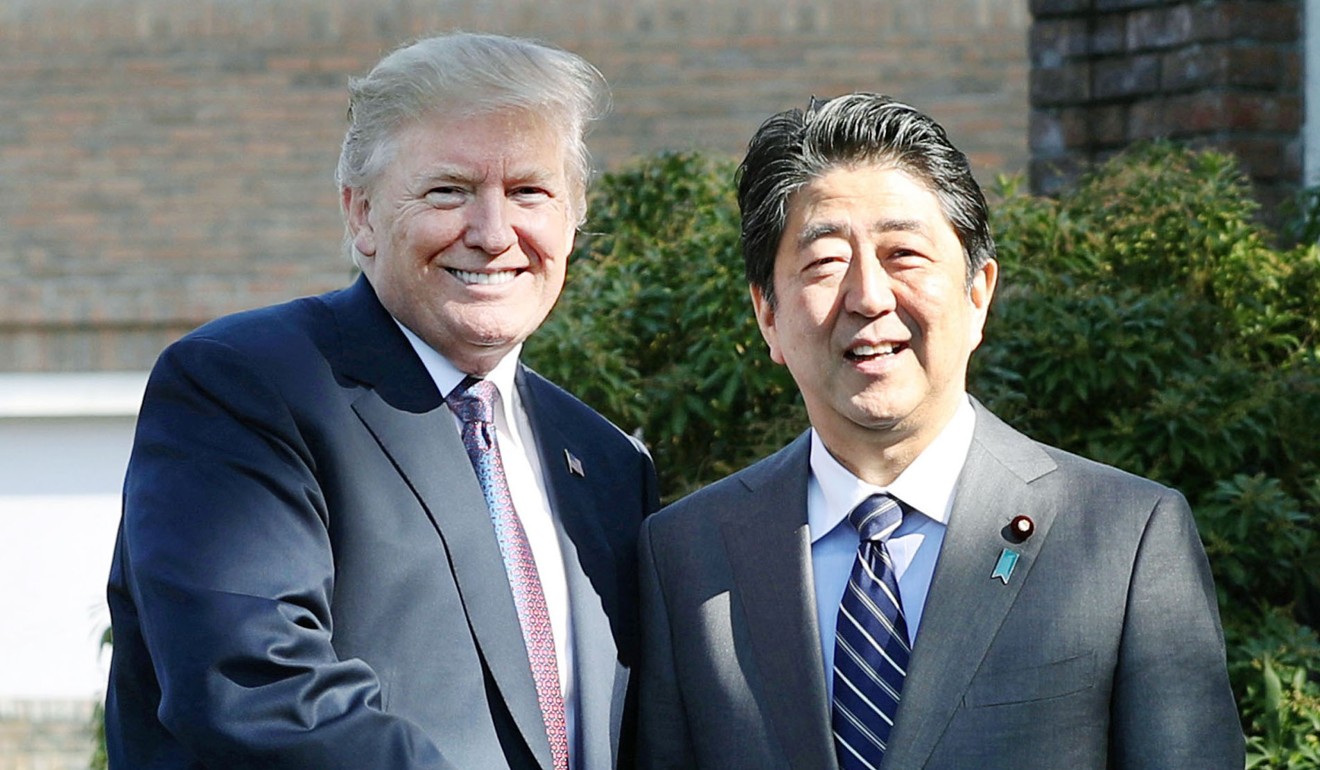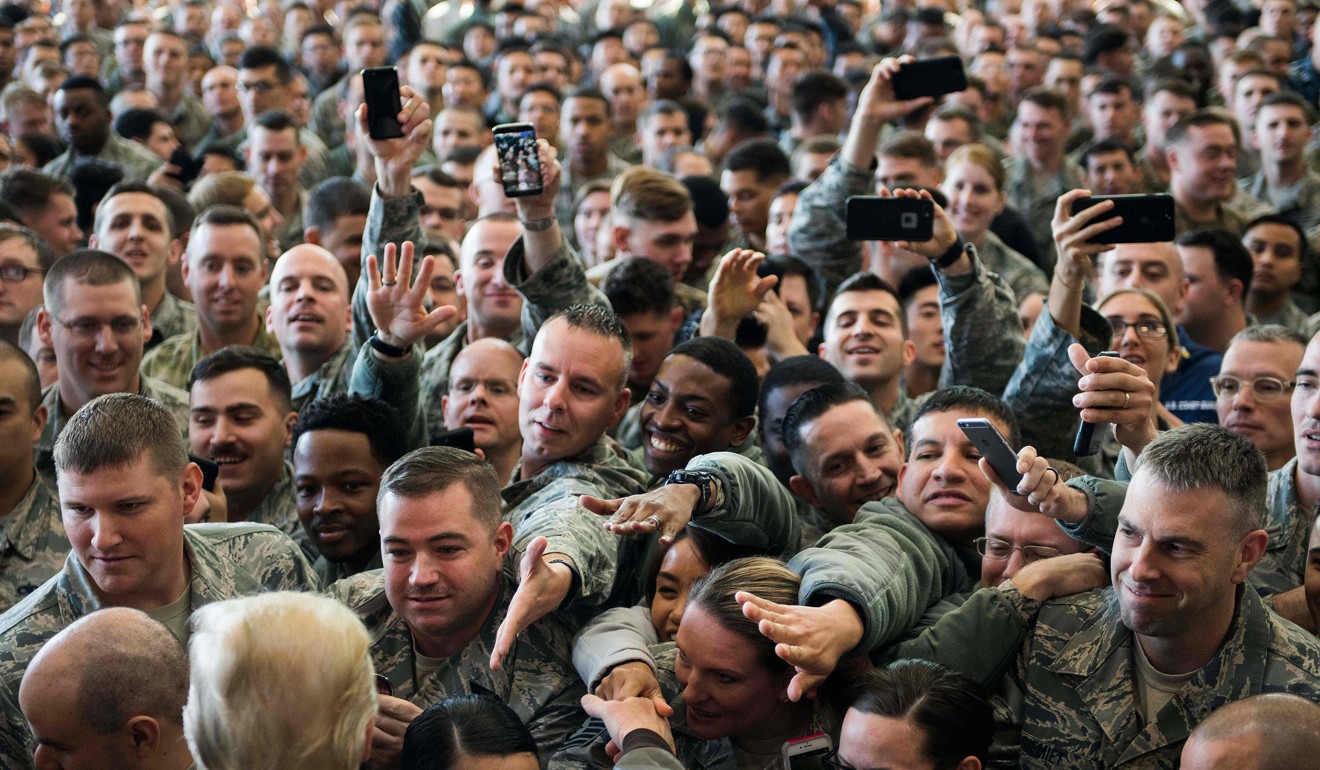
‘No dictator should underestimate US’: Trump talks tough before golf and steak with Prime Minister Abe in Japan
Ever since Saudi Arabia delivered a lavish welcome on Trump’s first international trip, leaders have tried to outdo themselves to impress the president, who has proven susceptible to flattery
US President Donald Trump on Sunday issued a stern warning that “no dictator” should underestimate the United States as he kicked off an Asian tour dominated by the North Korea nuclear crisis.
Speaking to cheering military personnel at Yokota Air Base just west of Tokyo minutes after landing, Trump donned a bomber jacket and said “no one, no dictator, no regime and no nation should underestimate … American resolve”.
“Every once in a while in the past, they underestimated us. It was not pleasant for them, was it?” roared Trump. “We will never yield, never waver and never falter in defence of our people, our freedom and our great American flag.”
Trump’s marathon trip began with the North Korea crisis at fever pitch, as US bombers fly sorties over the Korean peninsula and fears mount of another Pyongyang missile test. But with a round of golf, a custom cap and a hamburger of American beef, Trump’s first trip to Asia began with a taste of home.
We will never yield, never waver and never falter in defence of our people, our freedom and our great American flag
Prime Minister Shinzo Abe welcomed Trump with an effusive display of friendship that, in the days ahead, will give way to high-stakes diplomacy. The two leaders, who have struck up an unlikely but easy rapport, shared a casual lunch and played nine holes at the Kasumigaseki Country Club, joined by professional golfer Hideki Matsuyama.
The low-key agenda was a prelude to the formal talks, a press conference and state dinner planned in Tokyo on Monday. Abe will be looking for a united front against North Korea and reassurances that the US will stand by its treaty obligations to defend Japan if attacked.
Eager to forge a bond with Tokyo’s crucial ally, Abe was one of the first world leaders to court president-elect Trump. He was the first to call Trump after the election, and rushed to New York days later to meet the president-elect and present him with a pricey, gold Honma golf driver. The two men also met on the sidelines of an international summit in Italy this spring and Trump hosted Abe in Florida. White House officials said Trump has spoken with Abe by phone more than any world leader, aside from British Prime Minister Theresa May. That bond was clear on Sunday.
“The relationship is really extraordinary. We like each other and our countries like each other,” Trump said on Sunday night before dinner with Abe, who for this meal did show Trump traditional cuisine with a teppanyaki dinner. “And I don’t think we’ve ever been closer to Japan than we are right now.”

Trump and Abe also exchanged glowing tweets about their golf. Trump dubbed Abe and Matsuyama “wonderful people,” while Abe called it a “round of golf with a marvellous friend.”
Abe told reporters after the golf session that the two could talk frankly in a relaxed atmosphere while out on the course. He said they were able to “carry out in depth discussion, at times touching on various difficult issues”. A senior White House official, briefing reporters on condition of anonymity, said the pair had discussed trade and North Korea – but didn’t keep score.
The relationship is really extraordinary. We like each other and our countries like each other
From the time Marine One landed on the Kasumigaseki Country Club’s driving range, Abe rolled out little touches to make Trump feel welcome. He presented a hat that had a version of Trump’s campaign theme, this time reading “Donald and Shinzo: Make Alliance Even Greater.” The two passed up the region’s famed Kobe beef in favour of the American version, which is favoured by Trump, a renowned picky eater.
When Trump hosted Abe in Palm Beach earlier this year, they played at one of Trump’s Florida golf courses. For that outing, Trump brought along pro golfer Ernie Els, so this time Abe matched him by bringing along Matsuyama, whom Trump described on the plane ride to Asia as “probably the greatest player in the history of Japan”. Abe was behind the wheel of a golf cart as the two men were spotted moving from hole to hole, Trump in the passenger seat smiling and waving at those they passed.
“From the point of view of Abe administration, the personal chemistry that exists between the two leaders is seen as an asset,” said Mireya Sollis, chair in Japan Studies for the Brookings Centre for East Asia Policy Studies.
She said that the Japanese believe it is already “seeing it pay off”, including when Trump agreed to meet with the families of Japanese citizens kidnapped by the North Korean regime, an important issue for Tokyo.

Ever since Saudi Arabia delivered a lavish welcome on Trump’s first international trip, leaders have tried to outdo themselves to impress the president, who has proven susceptible to flattery.
Before the game, Trump delivered a speech in which he hailed Japan as a “crucial ally” and warned adversaries not to test America’s resolve.
“Japan is a treasured partner and crucial ally of the United States and today we thank them for welcoming us and for decades of wonderful friendship between our two nations,” Trump told American and Japanese service members at Yokota Air Base.
However, the easy rapport with Japan could be strained if Trump takes an aggressive approach on trade or the two men disagree on how best to approach the threat looming in Pyongyang.
During his campaign, Trump suggested Japan should acquire its own nuclear weapons to defend itself, hinted the US might not come to the nation’s defence, and accused Japan of “killing us” on trade. He has dropped that antagonist language almost entirely since the election, but tensions remain.

Scott Seaman, a director for Asia of the Eurasia Group, a political risk consultant organisation, noted: “everything is fine with Trump until you tell him no. So far, Abe hasn’t told him no.”
After Japan, Trump will travel to Seoul, where his relationship with South Korean President Moon Jae-in is noticeably cooler.
Trump labelled Moon’s dovish approach to North Korea as “appeasement” on Twitter, a comment that did not go down well in Seoul’s presidential Blue House.
Trump will speak to South Korean MPs but not follow the well-trodden path to the Demilitarised Zone dividing the Korean peninsula – a visit derided in Washington as a bit of a “cliché”.
From Seoul, Trump travels to China to meet his counterpart Xi Jinping who, like Abe, has solidified his grip on power after being handed a second term.
Trump said before his trip that China could have a “big problem” with “warrior nation” Japan if the North Korea issue is not solved.
Additional reporting by Agence France-Presse

